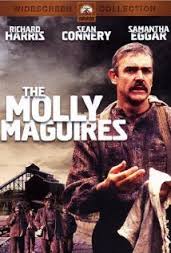
THE MOLLY MAGUIRES.
US, 1969, 125 minutes, Colour.
Richard Harris, Sean Connery, Samantha Eggar, Frank Finlay, Anthony Zerbe.
Directed by Martin Ritt.
The Molly Maguires was directed by Martin Ritt, the director of Hud, Hombre, The Spy Who Came in From the Cold, Sounder. This is another impressive film about an Irish secret society that existed in the coal mining districts of Pennsylvania in the 1870's. The film gives what must be a fairly accurate picture of conditions under which the miners and their families lived and worked and died. And since the forces of law and order were controlled by the mine owners, the only defence of the immigrant Irish workers seemed to be violent reprisals against the police and their employers. This film concerns the last days of the society and the conscience problems of the Irishmen paid by the police to infiltrate and destroy it. Sean Connery is the mining leader, Richard Harris the infiltrator. The audience is left to decide the moral rights and wrongs of this social condition, the activities of the Molly Maguires and the treachery of the informer. As a thoughtful commentary on the social injustice and its effects on human beings, the film can be recommended.
1. The significance of the title? The Irish overtones? The Pennsylvania mining situation? The indication of work and justice themes?
2. How appropriate the use of Panavision and colour? The visual presentation of Pennsylvania and the mines, 19th century atmosphere? The refrain and the musical themes? The use of Irish traditional melodies?
3. The importance of mood and the atmosphere for this exploration of character, crises, social injustice? The detailed and lengthy presentation of the opening work in the mines culminating with the explosion? An indication of the themes and values of the film?
4. The importance. of the detail of work in the mines? How clear was the nature of the employers oppression of the miners? The importance of the pay scene and the refunds for broken tools etc.? The way of life of the miners in the town, the inn, the tavern, the homes? The quality of the way of life of the miners?
5. Was it clear that the motivation for the Molly Maguires was one of social injustice? Did the film explain why they were an organisation for twenty years? The pressure on the wives and their support, the tense atmosphere in the taverns. the drinkers and the overtones of conspiracy and violence? The importance of the denunciations by the parish priest and the excommunication threat for such violence?
6. Jack Kehoe as the hero of this film? The loner, his hold over the others, his relationship with his friends, with his wife? His stand in the town? With the parish priest? What motivated him? The testing of McParlan? and running the risk? The organization of the raids and the involvement? The strong determination to press through despite opposition and spies from the police? How admirable a man? How misguided? How earnest?
7. The contrast with McParlan? The stranger entering the town and changing it, his cover and background story, his role as a kind of hero in the film? How much audience sympathy for him in his work, in his deception? Audiences identifying with Mary in responding to ]is charm? Later disillusionment with him? His involvement in the raids and wanting to save lives? His warning the police? His relationship with Davies? Audience response to an undercover man in this kind of situation? The effect on his conscience and feelings? His hostility to the Molly Maguires and their violence? His hostility to Davies and his callous attitudes?
8. Mary as a character and as a representative of the way of life in the town? Her ambitions to get out of the town? Her relationship with her father? The importance of the romantic interlude between them? The beautiful scenery contrasting with the mines?
9. The final conflict and arrest of Kehoe and his men? The dramatic impact of the court case? McParlan? and Davies playing cards? McParlan? in the stand? Kehoe in the stand? Mary's decision not to go with McParlan? and the disappointment for him? McParlan's need to go to the prison for some kind of reparation? Kehoe's friendship yet unwillingness to forgive him?
10. The picture of Davies and the law? The rights of the police, the protection of citizens? His callous attitudes? Impersonal attitude towards McParlan? and Kehoe?
11. How important was it to see the raids, the murders and ambushes? The police violence and the Molly Maguire violence? Could audiences make up their minds about the right and wrongs involved?
12. The portrayal of people and their lives, physical and work conditions, social justice, relationships?
13. The question of truth and lies in such a difficult situation?
14. What values were explored in this film? How well? As an exploration of an aspect of American history, 19th century history, changes in social justice?